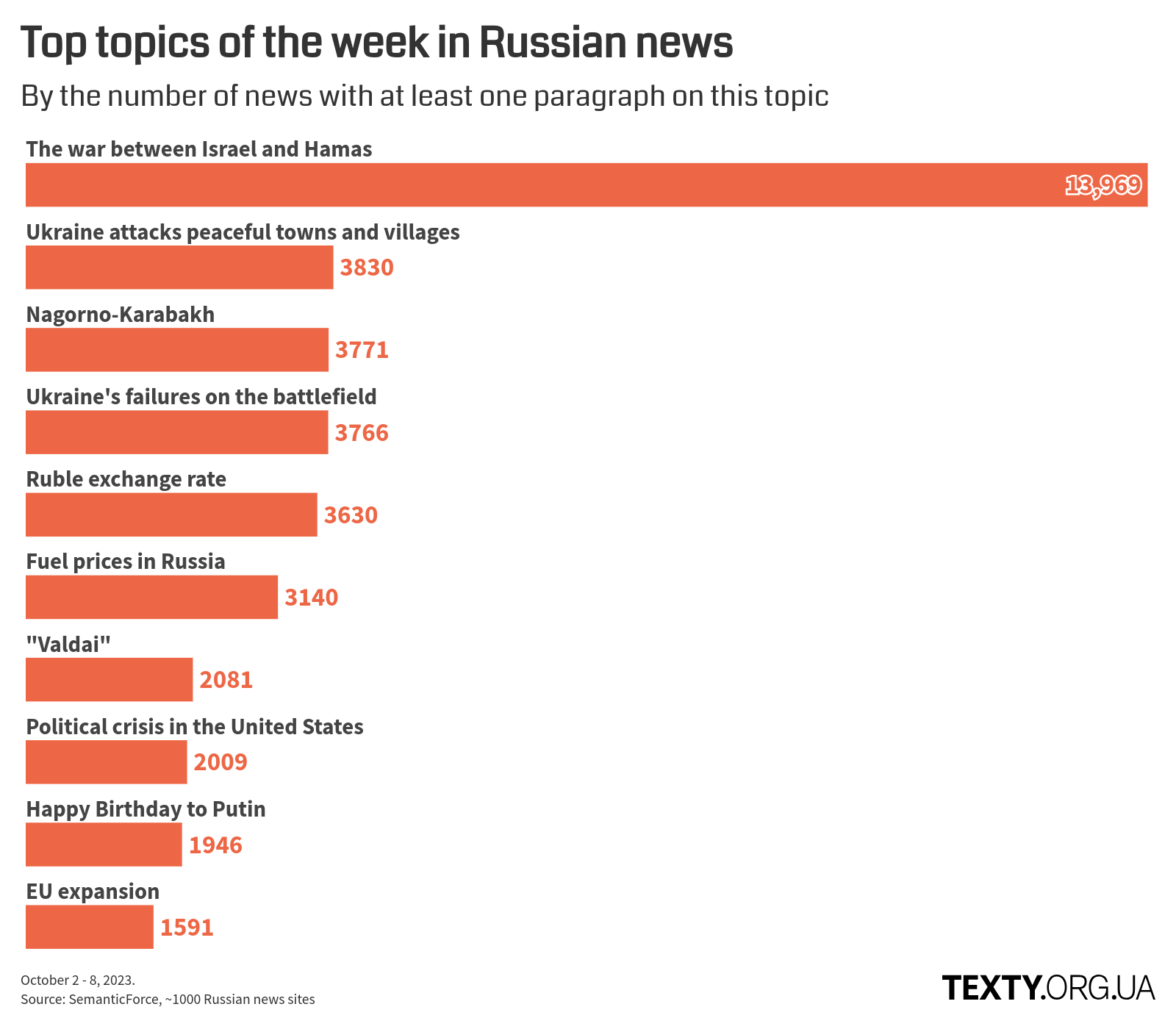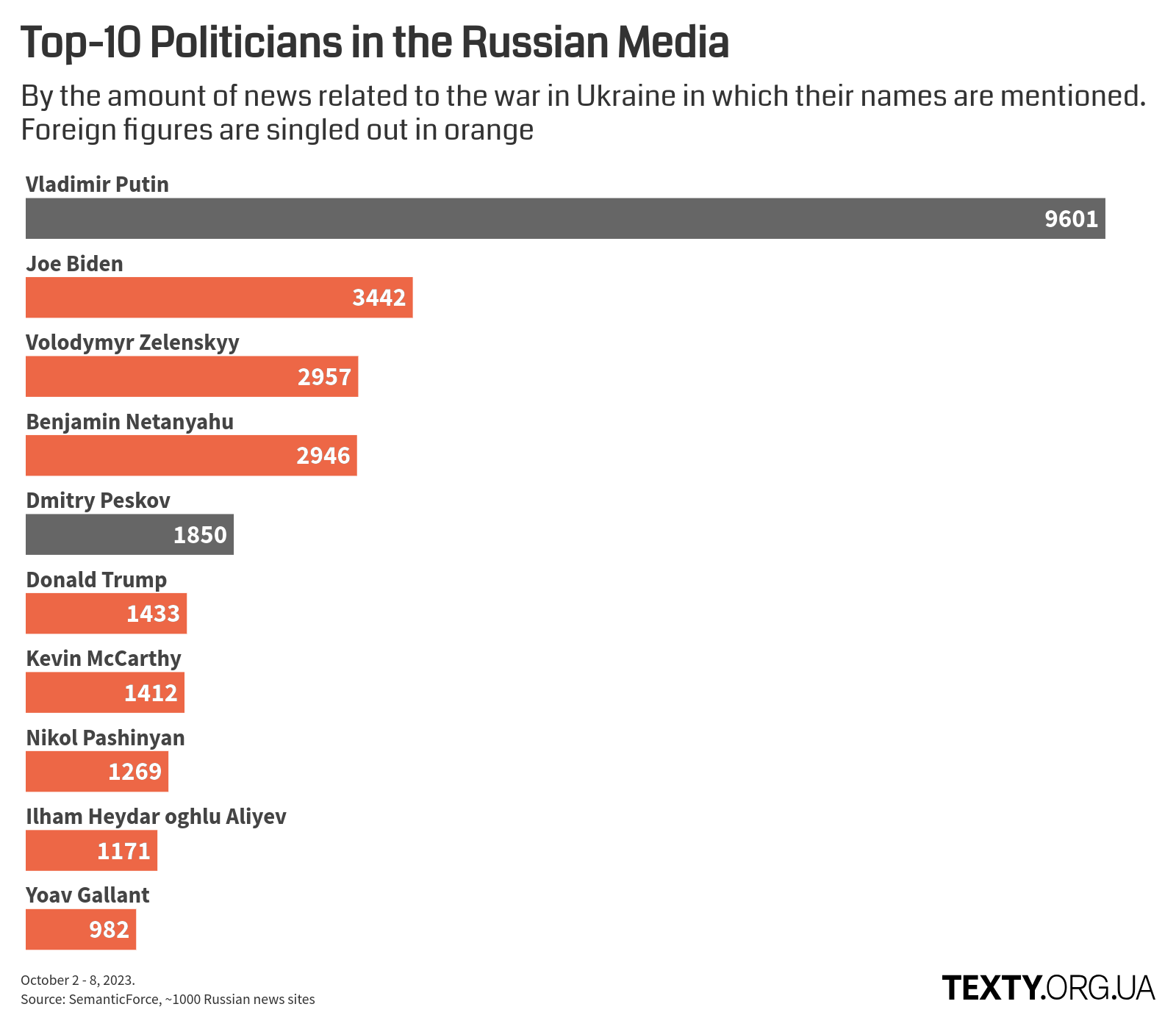A Week of Nuclear Blackmail. Russian Media Monitoring Report, 2-7 October 2023
Last week, Russian media brimmed with excitement over the successful launch of a Burevestnik (Thunderbird) missile. The propagandists described it with such words as “game-changer” and “unparalleled capabilities” and claimed it to be able to destroy cities anywhere in the world.

To make the saber-rattling even louder, Putin announced the upcoming combat deployment of the Sarmat ICBM, Russian propaganda’s long-time darling. Yet, Putin's last year’s promise of the same never materialized.
Follow the trending topics of Russian disinformation on our interactive dashboard “Disinformation about the War in Ukraine”
The propagandists kept a close eye on the ratings of European political movements which support friendly ties with Russia and discussed the possibility of blowing up a thermonuclear warhead over Syberia as suggested by the editor-in-chief of the RT channel Margaryta Symonyan.
This monitoring report covers these and other topics of the disinformation spread by Russian state media and online parajournalists to manipulate public opinion.
The Fight Continues
Kremlin's information minions praised the Russian army for its success in Ukraine. Russian media discussed the prospects of capturing new territories in Kharkiv and Donetsk oblasts: ”Capturing Kupyansk and Izyum will enable the Russian military to assault Slavyansk and Kramatorsk from the rear and pave way for a speedy liberation of DPR”.
Russian propagandists have been talking about an upcoming a Russian counteroffensive for weeks. Despite all the gruesome battlefield reality, they still cherish the dream of taking Kyiv. Such enthusiasm stems from Ukraine’s lack of progress on the Zaporizhzhia front: ”The Ukrainian counteroffensive has stalled: their military is not showing any significant success on the front line. Such indecision and lack of resolve may help the Russian army to seize the initiative and go on the offensive pushing swiftly towards the Ukrainian capital”.
The disinformation media do not even bother to cover minor tactical gains of the Ukrainian army near Bakhmut. It was as early as in the middle of September that the General Staff of Ukraine reported on the liberation of Andriivka and Klishiivka villages. However, certain so-called Russian military experts pretend to be unaware of the fact and claim the Russian army to be winning the battle for Klishiivka”, “The Ukrainian militants have been suffering staggering losses in the Donetsk area — up to a battalion each day. All their attempts to take Kleshcheevka under control have been futile while the Armed Forces of Russia are making their positions more and more impenetrable”.
Russia’s Nuclear Fantasies
Nuclear weapons were one of the biggest news makers on Russian media last week.
The propagandists insisted that the world’s largest nuclear arsenal makes Russia invincible: “There is no way to defeat Russia in the battlefield. Russia's military defeat is so absurd that it is beyond conceivable. Even NATO's direct involvement does not change anything: the possibility of such a defeat would threaten the existence of Russia as a sovereign state and, therefore, would provide a valid reason for using nuclear weapons according to our military doctrine”.
They even quoted a shaman to support this argument: “Therefore, if somebody decides to use a nuclear weapon, Russia will show the world the true might of its nuclear capabilities. This is why they are so afraid and keep talking about negotiations and peace treaties… said the shaman according to the agency”.
The members of the State Duma of the Russian Federation added fuel to the fire by saying that Russia would revoke its ratification of Comprehensive Nuclear-Test-Ban Treaty. As usual, Moscow blamed the United States for all the consequences of such steps: “The U.S. government is delaying the entry into force of the Comprehensive Nuclear Test Ban Treaty (CTBT) and continues to maintain its own nuclear infrastructure”.
It was Putin himself who played a central role in the nuclear blackmail. In his speech at the meeting of Valdai Discussion Club, a propagandist forum, the president of Russia announced that “Russia conducted the last successful test of the Burevestnik, a global-range cruise missile with a nuclear propulsion system”.
Russian media hurried to claim that the missile “is capable of destroying entire urban districts and large military installations”, “When a crisis breaks out, dozens, if not hundreds of such missiles can take to the skies to cruise over above the Earth's surface. Their nearly indefinite range will enable them to manuever over neutral waters for a very long time and strike on command”.
In his speech at the Valdai Forum in Sochi, Putin also said that Russia had almost completed the development of the Sarmat missile before launching its mass production: “The Sarmat, the super-heavy intercontinental ballistic missile, is nearly 100% complete. We just need to sort out some bureaucratic formalities before its mass production and deployment on combat duty. This is going to happen in the nearest future”.
The claims followed a similar statement a year ago. This is what Putin said on 21 June 2022: “Russia has successfully tested the Sarmat super-heavy intercontinental ballistic missile. It is planned that by the end of the year, the first such complex will be on combat duty”. Putin's last year’s statement turned out to be a lie.
Russia’s top propagandist, the RT editor-in-chief Margaryta Symonyan “suggested detonating a nuclear bomb at an altitude of about 100 kilometers “somewhere over Siberia”: “She said that “an explosion hundreds of kilometers away from the nearest big city” would help to avoid a nuclear winter and casualties from cancer, but would destroy all communications electronics and all satellites. Such a “nuclear ultimatum” would be a key to resolving the Ukrainian conflict”.

Putin’s European Friends Are Back in Office
The Russian disinformation machine paid a lot of attention to the elections in Slovakia which might promise a revival of friendship with Russia. On October 2, the pro-Russian Smer party led by the populist Robert Fico won the parliamentary elections. The party which intends to stop helping Ukraine won 24% of the votes and will now attempt to form a coalition government.
Russian media reported on the event quite enthusiastically: “After the victory of the party led by the former Prime Minister Robert Fico in the parliamentary elections, the Slovak authorities have already refused to provide further military aid to Kyiv”.
Propagandists hinted that the victory would drive a wedge into the European Union and NATO itself as Fico upholds the interests of Slovakia which definitely exclude a confrontation with Russia: “Ukraine loses a faithful ally and the EU and NATO are facing a rift due to the disagreements between the alliances and Bratislava on the conflict with Russia”, “The people of Slovakia have always felt positively towards Russia and today Slovaks see more advantages in the cooperation with our country than disadvantages and consider it an important economic partner”.
According to the disinformation media, it was the promise of stopping military aid to Ukraine that propelled Fico to victory: “Fico swore to put an end to all the military aid to Ukraine. Mind you, this promise was the staple of his election campaign and resonated perfectly with the public sentiment”.
The increase in popularity of the Alternative for Germany (AfD) was explained with the desire to curtail aid to Ukraine and foster relations with Moscow: “AfD is the only party represented in the Bundestag that advocates the normalization of relations and economic cooperation with Russia... more than 22% of German citizens are willing to support the party in the next federal elections”.
Kremlin's information minions are confident that Germans are growing disappointed and starting to rally against supporting Ukraine in its fight against Russia: “The residents of the country are losing faith in their leaders who are guided by foreign interests,” “There has been a recent protest against supporting Ukraine organized by the activists of the Querdenker movement associated with the opposition right-wing party Alternative for Germany (AfD)”.
Germany's decision to impose a ban on Russian energy imports was named as one of the reasons for such a reversal of public opinion: “Berlin's energy and economic policy sparked a mass protest. Several thousand protesters are demanding the federal government to stop sending weapons to Ukraine and calling them to resolve the conflict by peaceful negotiations”.
This propagandist message seemed to be intended to add weight to the statements of Russian politicians saying that Europe cannot survive without Russian oil and gas.
The Methodology
To monitor the information published on disinformation websites, we analyzed approximately 410,000 news reports collected from ~ 1000 Russian and occupation websites. The data for the analysis was provided by SemanticForce.
Each paragraph was processed using an algorithm which defines its topic automatically. The resulting topics (i.e. groups with similar content) were short-listed by the topics relating to the war or its consequences for Russia. The number of mentions of a certain topic was then counted for each publication. Our conclusions are based on the respective findings and the quotes from paragraphs referring to each topic.


